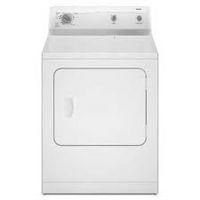Difference between revisions of "Gas Dryers"
| Line 12: | Line 12: | ||
The | The Gas Dryers use a burner assembly which is comprised of a control valve with 1 or 2 solenoids (also called coils), a gas jet, an igniter and a sensor. When the dryer is started, the igniter heats up, when the sensor detects the heat, it signals the solenoid on the control valve to open and release the gas which is then lit by the glowing hot igniter. The igniter turns off but the gas jet remains open. The burning jet of gas keeps the sensor warm which keeps the gas valve open, until the thermostat signals the control valve to stop the flow of gas. | ||
Revision as of 01:57, 2 August 2012
The Gas Dryers work by tumbling the clothing and blowing air through the drum. The drum has baffles protruding into the drum to keep the clothes from bunching up. The length of time the dryer runs and the air temperature are elements of the various drying cycles.
A motor turns the clothes drum and also turns a fan (called the blower). The air flow from the blower passes over a heating element (in an electric dryer) or through a gas jet (in a gas dryer). The air then passes through the drum and out the back of the dryer through ducts to the vent which is typically located outdoors.
The Gas Dryers use a burner assembly which is comprised of a control valve with 1 or 2 solenoids (also called coils), a gas jet, an igniter and a sensor. When the dryer is started, the igniter heats up, when the sensor detects the heat, it signals the solenoid on the control valve to open and release the gas which is then lit by the glowing hot igniter. The igniter turns off but the gas jet remains open. The burning jet of gas keeps the sensor warm which keeps the gas valve open, until the thermostat signals the control valve to stop the flow of gas.
The dryer cannot operate until the door switch signals that the door is closed. The start button must then be pressed to enable the timer control. The timer control either regulates the length of time the dryer runs or it works in conjunction with a moisture sensor that measures the water vapor in the drum to determine when the clothes have dried.
The temperature selector controls the maximum temperature inside the drum with the aid of thermostats. The heat turns on and off as needed to maintain the temperature.
When the timed cycle ends, or the moisture sensor determines the clothes are dry, the drying cycle ends and typically a buzzer sounds to signal that the cycle has ended.
Some dryers have a wrinkle prevention feature that will tumble the dryer every few minutes to prevent wrinkles from setting in.
Video
